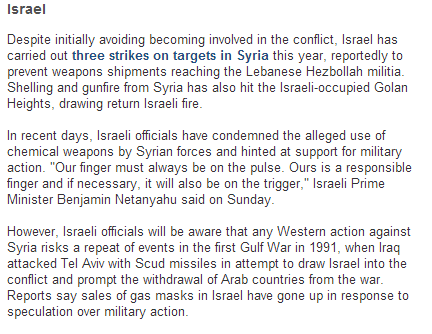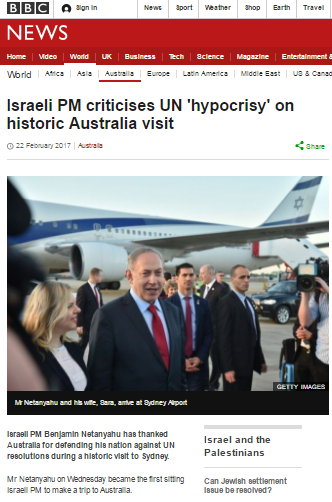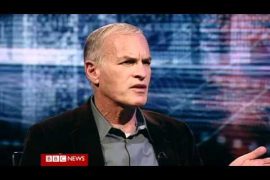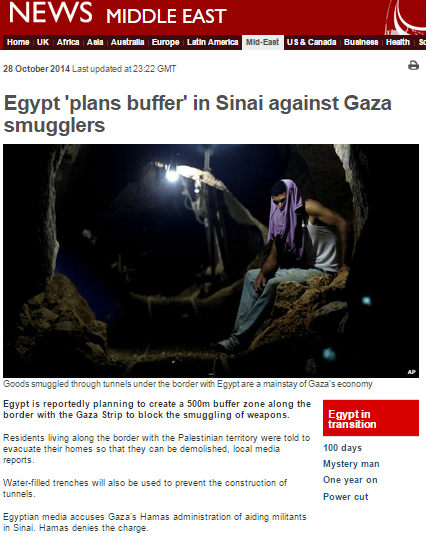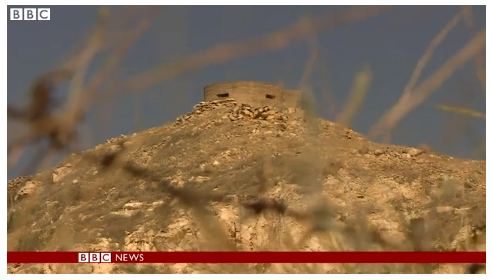Among the reams of coverage of the subject of possible Western military action in Syria appearing on the BBC News website’s Middle East page we find an article titled “Syria crisis: Where key countries stand” dating from August 27th.
The article opens:
“The US and its allies are said to be considering military action against sites in Syria. But what do countries in the region and beyond think about any possible action?”
Countries of course do not “think”; in fact the article purports to condense the stances of various governments in the Middle East and elsewhere on the subject of potential Western action into a few bite-sized sentences.
Here is what it says about Israel.
“Despite initially avoiding becoming involved in the conflict, Israel has carried out three strikes on targets in Syria this year, reportedly to prevent weapons shipments reaching the Lebanese Hezbollah militia. Shelling and gunfire from Syria has also hit the Israeli-occupied Golan Heights, drawing return Israeli fire.”
In spite of the BBC’s suggestion to the contrary, Israel is not “involved in the conflict” in Syria. That conflict is a civil war between Assad loyalists (and their foreign allies) and anti-Assad rebels (and theirs) and Israel does not support one side or the other. Any actions which may have been taken by Israel are exclusively linked to the protection of its citizens.
The link appearing in this paragraph leads to a Q&A article published by the BBC on May 5th of this year which also tried to imply Israeli ‘involvement’ in the Syrian conflict. The use of the phrase “reportedly to prevent weapons shipments..” is clearly meant to signal to BBC audiences that the writer of this report is not convinced that is the case – a theme which has also been promoted by the BBC on previous occasions, not least by its Middle East Editor.
In the interests of the BBC’s supposed commitment to accuracy, the final sentence of that paragraph should of course have made clear the fact that Syrian shelling and gunfire into the Golan Heights has sometimes drawn return Israeli fire – but in the majority of cases it has not.
The article goes on:
“In recent days, Israeli officials have condemned the alleged use of chemical weapons by Syrian forces and hinted at support for military action. “Our finger must always be on the pulse. Ours is a responsible finger and if necessary, it will also be on the trigger,” Israeli Prime Minister Benjamin Netanyahu said on Sunday.”
The juxtaposition of those two particular sentences is clearly intended to suggest to BBC audiences that any Western military action in Syria is likely to include Israel. However, the partial quote from PM Netanyahu used to suggest that is taken out of context.
Netanyahu’s words were said during a meeting of the Israeli cabinet on August 25th and in fact related to the subject of Israeli self-defence in the event of attacks on Israel by the Assad regime or any of its allies rather than in the context of Israel’s joining a Western coalition to take action in Syria.
” “From this we draw three conclusions,” Netanyahu continued, “One, this situation must not be allowed to continue. Two, the most dangerous regimes in the world must not be allowed to possess the most dangerous weapons in the world. And three, we expect that this will stop, of course, but we must always remember our sages’ ancient principle: ‘If we are not for ourselves, who will be for us?’”
“That is to say, our finger must always be on the pulse. Ours is a responsible finger and if necessary, it will also be on the trigger. We will always know to defend our people and our state against whoever attacks us, tries to attack us or has attacked us. This is the principle that has consistently, constantly and responsibly guided this government, and thus it will continue,” he concluded.”
The BBC article goes on:
“However, Israeli officials will be aware that any Western action against Syria risks a repeat of events in the first Gulf War in 1991, when Iraq attacked Tel Aviv with Scud missiles in attempt to draw Israel into the conflict and prompt the withdrawal of Arab countries from the war. Reports say sales of gas masks in Israel have gone up in response to speculation over military action.”
The statement that “Iraq attacked Tel Aviv with Scud missiles” is of course inaccurate. As was reported by the BBC itself at the time, Scud  missiles were also fired by Iraqi forces at Haifa and other locations in Israel, including the Dimona region in the Negev.
missiles were also fired by Iraqi forces at Haifa and other locations in Israel, including the Dimona region in the Negev.
The statement “sales of gas masks in Israel have gone up..” is also inaccurate. Gas Masks are not sold to the Israeli public, but distributed by the Home Front Command, in part via the Postal Services.
Interestingly, in the section titled “Lebanon”, this BBC article does not make any reference to Lebanon being “involved” in the conflict in Syria, despite the fact that Hizballah – which holds seats in the Lebanese parliament and government – is actively fighting there.

